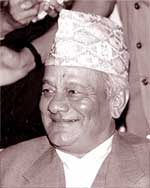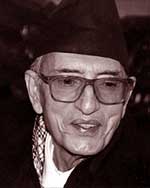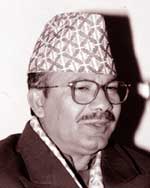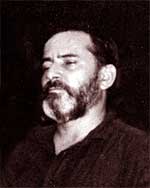 The triangular struggle for Nepal's soul is going around in circles. You can gauge the gravity of the situation from the number of phone calls Comrade Prachanda has been making to leaders of mainstream political parties. From Girija Prasad Koirala to Madhav Kumar Nepal to Narayan Man Bijukchhe, the question is the same: how could you?
The triangular struggle for Nepal's soul is going around in circles. You can gauge the gravity of the situation from the number of phone calls Comrade Prachanda has been making to leaders of mainstream political parties. From Girija Prasad Koirala to Madhav Kumar Nepal to Narayan Man Bijukchhe, the question is the same: how could you? The rebels didn't have to recognise Prime Minister Lokendra Bahadur Chand's government to feel comfortable talking to his housing and physical planning minister. They outsmarted the rest of us in recognising the futility of talking to mainstream political parties pushed to the margins. If the people don't seem to have a problem with the palace having become the real repository of power, how could those who have been fighting in their name?
 That was the easy part. For an organisation that has thrived in subterranean existence, transparent action can often prove traumatic. In his first formal interview since last month's cease-fire, the Maoist supremo said the success of the peace talks would depend on a serious approach by all three camps. We can holler all we want about how the record puts the onus on the rebels to prove their commitment to peace. Their understanding of events hardly resembles ours. Actually, the Maoist perspective on why the last peace talks failed might succeed in illuminating the ambiguous course ahead. (It turns out that Sher Bahadur Deuba's original strategy to prolong his tenure consisted of dragging on the peace talks as long as he could.)
That was the easy part. For an organisation that has thrived in subterranean existence, transparent action can often prove traumatic. In his first formal interview since last month's cease-fire, the Maoist supremo said the success of the peace talks would depend on a serious approach by all three camps. We can holler all we want about how the record puts the onus on the rebels to prove their commitment to peace. Their understanding of events hardly resembles ours. Actually, the Maoist perspective on why the last peace talks failed might succeed in illuminating the ambiguous course ahead. (It turns out that Sher Bahadur Deuba's original strategy to prolong his tenure consisted of dragging on the peace talks as long as he could.)  The Maoists have a real interest in leaving the past in suspended animation. By focusing on the objective realities that impelled them towards dialogue, they can talk of war and peace in the same breath with Clausewitzian conviction. Our rush to forgive or forget the past must not be allowed to obscure its lessons, particularly those pertaining to the nation's early-detection capabilities. Chiranjibi Wagle and Krishna Bahadur Mahara were two days away from the second round of peace talks in Bardiya on 9/11. It was becoming clear after the 10PM English news on NTV that the status quo had lost its relevance. The peace talks would have to continue with greater urgency. Or the rebels would have to return to the jungles before the battle lines of the emerging war on terror became clearer. The Maoists suspended their demand for a republic as Badal's stock soared among cadres in the rural hinterlands. In those delicate times, the scales could have tipped either way.
The Maoists have a real interest in leaving the past in suspended animation. By focusing on the objective realities that impelled them towards dialogue, they can talk of war and peace in the same breath with Clausewitzian conviction. Our rush to forgive or forget the past must not be allowed to obscure its lessons, particularly those pertaining to the nation's early-detection capabilities. Chiranjibi Wagle and Krishna Bahadur Mahara were two days away from the second round of peace talks in Bardiya on 9/11. It was becoming clear after the 10PM English news on NTV that the status quo had lost its relevance. The peace talks would have to continue with greater urgency. Or the rebels would have to return to the jungles before the battle lines of the emerging war on terror became clearer. The Maoists suspended their demand for a republic as Badal's stock soared among cadres in the rural hinterlands. In those delicate times, the scales could have tipped either way. It was a monumental mistake to have treated Mahara's threat in Bharatpur to create our own versions of the World Trade Centre and Pentagon as little more than a creative metaphor. The parties in parliament could have tempered the talks, but they were busy provoking each side to pummel the other. The primary task today is to watch for telltale signs and the burden falls on the mainstream parties. Amid today's strategic stalemate, it doesn't matter which of the two armed sides is sturdier. The real power could lie with the civilian centre if it recognised its central role in the round-table conference. The forum could serve as the political equivalent of a truth and reconciliation commission, where participants could unmask both democracy's dictatorial tendencies and the moral repugnance of political violence. Balancing peace and justice, forgetting and forgiving, healing and punishing are all part of the catharsis we've sorely needed since the creation of modern Nepal.
 Progressive mainstream political parties want to preserve the gains of 1990 while speech writers at the "regressive" palace are busy defining the monarch's role in the 21st century. Such contradictions are bound to encircle the round-table conference. The strength and value of the deliberations would depend on the independence with which the forum operates and the credibility that it holds among the people.
Progressive mainstream political parties want to preserve the gains of 1990 while speech writers at the "regressive" palace are busy defining the monarch's role in the 21st century. Such contradictions are bound to encircle the round-table conference. The strength and value of the deliberations would depend on the independence with which the forum operates and the credibility that it holds among the people. Koirala made a promising contribution in Dhangadi last week by asserting that Kangresis were ready to accept moral responsibility for the ills of 12 years of democracy. More important was his plea to the people to recognise the good things that have happened during this period. It might take an anguished nation a little longer to establish the authenticity of such candour. With more of it, though, the healing process could begin.


